Ryan Murphy's "Hollywood" Finale
 Tuesday, May 12, 2020 at 10:49AM
Tuesday, May 12, 2020 at 10:49AM 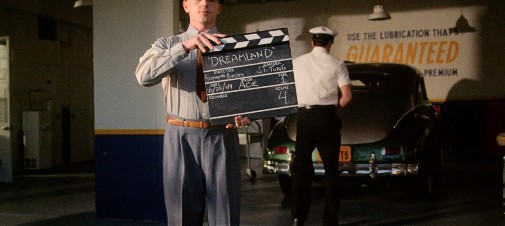
Sometimes artists dig their own graves by badly promoting or describing their works. Ryan Murphy's Hollywood is, to me, a good example of that. First off, the title is too vague, promising a portrait of Hollywood history instead of the fantasy the series presents. "Dreamland" would be an infinitely better name, both as a descriptor of the content and a tie-in to the narrative's details.
Titles aside, another big problem surrounding Hollywood is how many have been calling it revisionist history. It's no such thing…

Revisionism is a reinterpretation, a new way of looking at something that has been portrayed in a certain way before. Revisionist westerns, for example, aren't pictures that write a new American past. Instead, they offer a subversive point of view regarding the same subject matter of classic westerns. A heroic action that's been celebrated for many years can be seen as monstrous violence. Historical revisionism is thus radically different from an alternate history. The first is an intellectual reevaluation, while the second is a thought exercise often based on "what if" questions and wish fulfillment.
Despite what a lot of publications and Netflix itself have been proclaiming, Ryan Murphy's latest opus is not revisionist history, but an alternate history of Tinsel Town. Like many a fanfic author, Murphy has looked at the universe of his fandom and devised a bit of escapist joy that fixes perceived injustices and offers an intentionally unrealistic look at the past. Moreover, he has shown the same lackadaisical attitude to Hollywood's history as Old Hollywood always had towards world History. The past is filtered through modern values, facts are bent to fit a standard of glamourous fun, and popular entertainment is more important than facts.
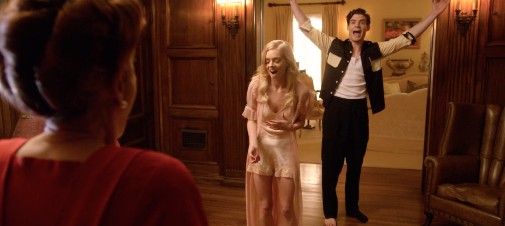
By this intro, you can probably surmise that I have a more positive take on Netflix's Hollywood than either Eric or Nathaniel who have previously recapped the show. That doesn't mean I'm blind to the production's many faults, just that I think its good aspects manage to outweigh the bad. We'll get there in a minute but, to follow in the model of the previous recaps, let's break down the last three episodes of Hollywood between the good, the bad, the ugly, and the not-so ugly. However, since I want to end this on a positive note, let's mix up the order a little bit, shall we?
THE BAD
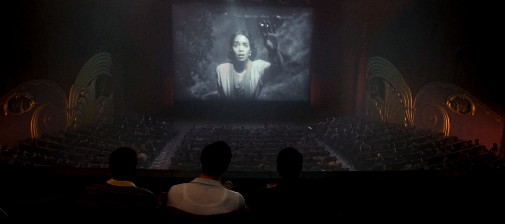
Meg. A lot of Hollywood's plot revolves around the filming, release, and reception of an interracial melodrama loosely inspired by Peg Entwistle's tragic life. While there's nothing necessarily bad about that, when a story revolves so much around the miraculous quality of a piece of art, it's better to let that perfection exist solely in the audience's imagination. To suggest greatness is often better than to attempt to create it and fail, which is what happens here. The little footage we see of the movie is mediocre, at best. Not to mention that, for all their effort, Murphy's crew was incapable of accurately replicating the look of 1940s cinema.
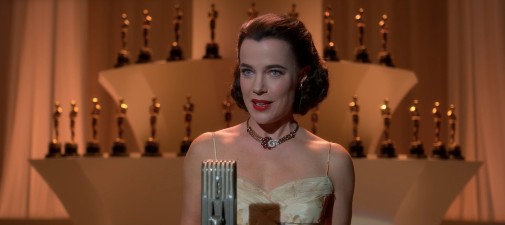
The real people. Another mistake that would have been easy to avoid is the inclusion of real-life characters that coexist with Murphy's fictional creations. While there are some exceptions, most of them are reductive, cartoonish even. Alternate history does better without the distraction and reduction of real history. The TV versions of Vivien Leigh and Rock Hudson are especially unfortunate.
Dumb factual mistakes. If you're going to recreate the 1947 Oscars with the inclusion of real-life characters at least try not to insert ones whose presence at the ceremony is utterly nonsensical. Why is Ernest Borgnine there when his first picture was released in 1951?
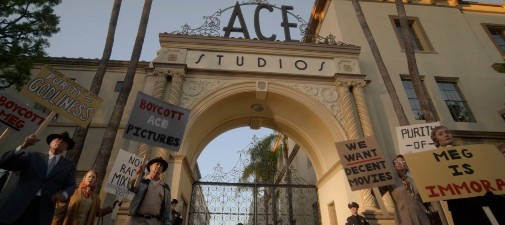
Too much... everything. Murphy has a taste for formal maximalism and it rarely works. So many moments of Hollywood are full of needless camera movements, editing flourishes that only break our sense of space and a bunch of blocking decisions that seem to have been done to show-off the costumes instead of visual storytelling.
The pacing. The last three episodes run through five hours worth of plot at a vertiginous pace. Because of that, a lot of important developments happen off-screen and characters behave in contradictory manners without any development explaining why.
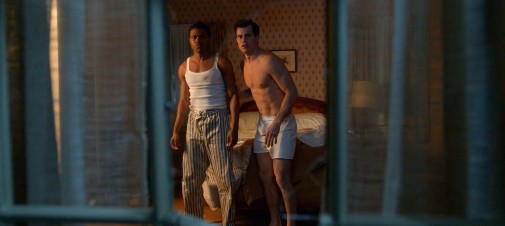
Some of the acting. Laura Harrier is beautiful but her performance as Camille Washington is rather dour, both when she's playing the actress and the character of Meg. As for Jim Parsons, he's perfectly vile as an oily incarnation of famed talent agent Henry Willson, but his shtick grows tiresome with each episode and the actor is incapable of making sense of his character arc.
THE UGLY
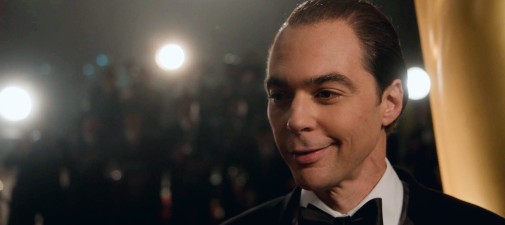
The redemption of a predator. Speaking of Henry Willson and his arc, after spending several episodes portraying Rock Hudson's agent as a sleazy manipulator and sexual abuser, Murphy forces an unconvincing redemption story that takes place in around three scenes near the end. There's some value to how the show portrays the survivors of his predation as justifiably incapable of forgiveness, but the show itself forgives Willson far too easily. Hollywood's views on sex and consent are very troubling.
The funeral. In the last episode, there's an important character death and the funeral is orchestrated as a sort of surprise twist. I'm trying to be vague so as not to spoil things, but it's a disgusting way to off a beloved character.
The snubs. As he did in Feud, Murphy has decided to recreate an Oscar ceremony, shoe-horning the fictional Meg into multiple categories with real nominees. To do that, you have to eras some real nominations including the one for Ethel Barrymore's work in The Paradine Case. I desperately need to know how the showrunners decided which nominees to obliterate. What did Barrymore ever do to you, Ryan Murphy?
THE NOT-SO UGLY
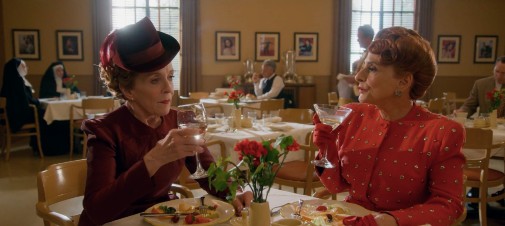
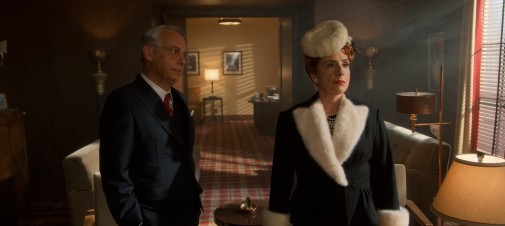
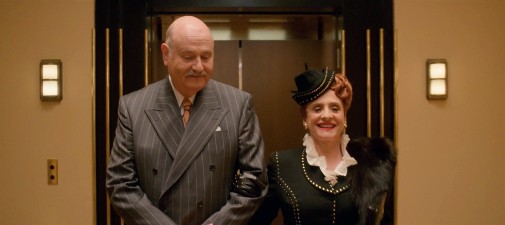
The glamour. While the overall design of the show is nothing special in terms of insightful details, it's spectacular eye candy nonetheless. Patti Lupone, in particular, gets to parade around in a collection of ridiculously fierce outfits more befitting Norma Desmond than a studio mogul.
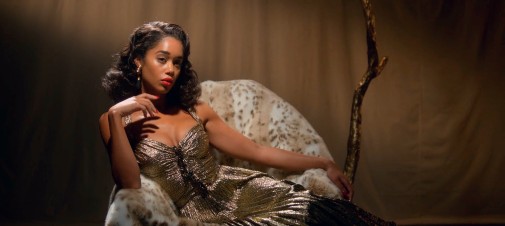
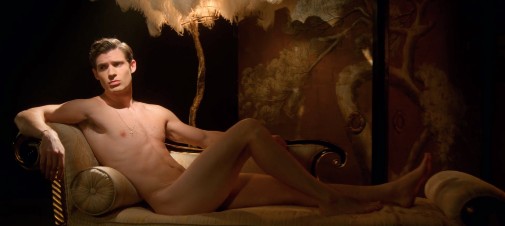
The cast. Speaking of eye candy, everyone in this show is stupidly good-looking. Even the extras look drop-dead gorgeous. It also helps that most of them are quite good, especially the dynamic duo of Joe Mantello and Holland Taylor as well as the chiseled greatness of Jeremy Pope and David Corenswet. And isn't it nice to see Mira Sorvino again?
THE GOOD
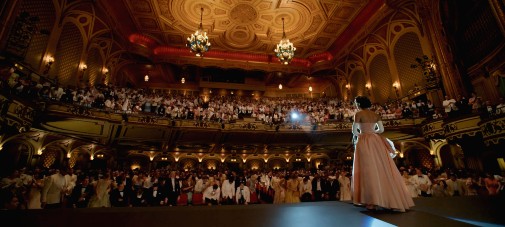
Wish fulfillment. I've long had a love for studying movie history, including the colorful past of Hollywood, as a place, a culture, an industry, and a concept. Because of that, many of the characters and storylines of this show were familiar. You see, when you spend so much time reading up on Hollywood's past, you realize that the glory of dreams coming true was something that only ever existed on the screen.
Behind the scenes, the history of the motion pictures is a depressing affair, full of tales of abuse, prejudice, persecution, desperation, and untimely death. If you know little of that history and are looking at Ryan Murphy's Hollywood as a source of education, you'll be sorely disappointed. What we see in the show is completely removed from reality, which becomes clear when the illegality of certain actions never comes up, for example, or when the anti-communist hysteria going on at the time gets no mention whatsoever.
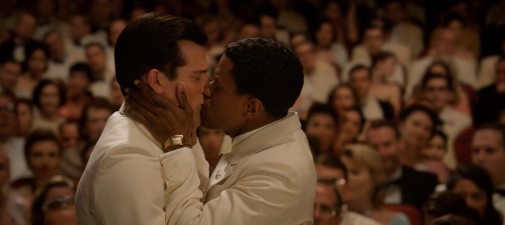
That may sound stupid (and it is a bit) but there's value in creating entertainment as an escape from reality. As a gay man, to look up stories of such individuals in the annals of Hollywood history is depressing more often than it isn't. If Murphy had decided to portray the factual life of Rock Hudson, Montgomery Clift, or Van Johnson, that would have value but it would also be another tale of gay people suffering through history as we've seen over and over again. To see one's sexual identity be constantly associated onscreen with suffering and misery is tiring, defeating even.
Sure, Rock Hudson kissing a black screenwriter at the Oscars is a ridiculous prospect with no basis in history. However, it's something that made me feel ecstatic. I wish that fantasy was the reality and, for a few minutes, it felt like it could have been. This alternate history does not erase the real one. If anything, its incongruencies regarding the facts, make the particularities of actual history feel more evident and unavoidable. The glorious success that Anna May Wong gets to live onscreen, only makes it clearer and more visceral how she was failed by the Hollywood system.
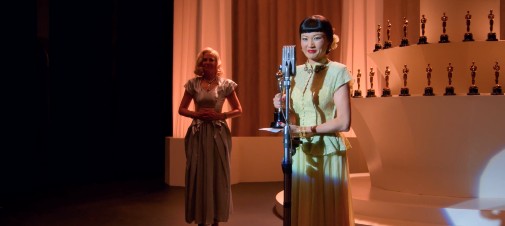
I confess that watching her win an Oscar made me teary-eyed with joy. Murphy's decision to intercut the segments at the Academy Awards with people listening at home and feeling the impact of those wins may be corny, but it's also so earnest it becomes endearing. Watching Hattie McDaniel be a sexual, sensual diva after real Hollywood relegated her to playing maids, eternally deprived of agency, felt great. She was, like Wong, a great actress that never got the opportunities she deserved. Maybe, this show will make people more eager to seek their classics, like Wong's Toll of the Sea, Piccadilly and Shanghai Express, or Hattie McDaniel's magnificent work in the underseen In This Our Life.
For all of that, I'm grateful for Ryan Murphy's Hollywood, even while acknowledging the show's faults. Reading up on many intelligent and very negative reviews, I've felt a bit stupid, like there's something wrong with me for liking this so much. It's a guilty pleasure, for sure. Still, while it's not perfect, I confess to enjoying Hollywood's syrupy, often tacky, and maudlin nonsense. It made me smile at a time when smiles are becoming increasingly rare.




Reader Comments (18)
The problem with Ryan Murphy's Hollywood is how he uses the Academy Awards, to achieve revisionism, in a series about minorities and injustice. Winning an Oscar does not equal justice or opportunities, it just means you have visibility. Just ask Halle Berry. The thing is that he uses the Oscars as triumphal metaphor while it can not be such thing.
However, the use of the Oscars in Ryan Murphy's Feud: Bette and Joan is more precise and dramatic, because of the context, of the character's conflict and motivations and because they think that the award can give them new opportunities (while it clearly can't).
Lamboste: I believe Murphy includes the Oscars to convey the notion that these people have been accepted and recognized by the Hollywood system.
I wish he would have told the true hidden history of gay people in Hollywood which is more interesting than this fantasy
This was entertaining enough for most of the season and a few of the actors are rather good in it. However, the scripting in the last couple of episodes and specifically in the latter half of the finale is just so bad. It makes me think there was some sort of production issue and they had to condense the story because as Claudio said they'll literally condense the story in a ridiculous way, packing 3 twists to one given story arch in 3 minutes. It becomes laughable. And a lot of the revisionism, while surely well-intentioned, came across kind of pandering and condescending to me... kind of hard to watch.
Haven’t read the article because I haven’t watched the series yet, but from watching the trailer I was shocked they mentioned ‘Dreamland’ so much then called it Hollywood.
Give it to Meg (1947) to be the solution for all the problems, a year after it won best picture, everything was good in the world, no more racism, homophobia and predators. We need a Meg this year to end this pandemic.
Listen, I liked it too, with all the cheesiness and the ridiculous plots and developments, again it's not good, but the last 30 minutes were unbearable, the self-importance of MEG and the writers, one fictional -mediocre- movie did what thousand and thousands of real movies couldn't, my god.
I had to laugh when Holland Taylor's character exclaimed, "they're making pictures with women now!" as a result of Meg. Girl, that era was a glorious time for women in film - that's why they're still remaking films like Little Women, Mildred Pierce, Rebecca, Sunset Boulevard, A Star Is Born, and Streetcar (after a fashion, in Blue Jasmine).
Disrespecting Vivien Leigh should be a capital offense. Straight to jail you go Murphy!
I agree that at no point does the show convince that the Meg movie was anything special, and even if a phenomenal interracial romance was made in even a fantasy 1947, Loretta Young would have still won. Because the nomination would have been seen as gesture enough. And who decided Robert Ryan wouldn’t be a nominee for Crossfire, but Thomas Gomez still made it??
Anna May Wong’s Oscar triumph was also for me the best moment of the show, even if I hope Jeremy Pope could have more than a chance to next Emmy
Despite the show’s obvious faults there were good moments throughout. It wasn’t all bad but by the last few episodes I couldn’t wait for it to be over.
I agree with most of the writer's points, especially the bad things and the conclusion. The show is bad, but somehow highly entertaining and then cringey, and then sparkly and bad, did I say bad? And yet, you don't feel angry at it, maybe it's because the fantasy it presents is so utterly ridiculous that you just buy it, because why not? Or maybe because the pace makes everything falsely look exciting. I don't now, but it's the only Ryan Murphy show I've enjoyed watching in years.
For me the worst part, was the betrayal to real life characters or to any truthful portrayal of any kind. This time didn't catch me by surprise as it did in Gianni Versace's murder where I think the whitewashing of a real life serial killer was just atrocious and despicable. Here, at least, thinking Hattie MacDaniel and Tallulah Bankhead might have had sex with each other is just harmless.
@Sarah-YES!!!!!
Full disclosure: I have not watched this series. But it seems that Ryan Murphy has a terminal problem with writing on his shows. I know he can helm good work--Feud, for the most part, really worked for me. There is so much fertile ground to mine here with the history of Hollywood at this period. So why is it so difficult to come up with a cohesive, compelling, insightful story as the basis for a series. Even if they want to go with an alternative history, it could still work if the writers know what they're doing and why. Murphy's formula is built-in to self-destruct. His shows lean too much into gratuitous sex, superficial scandal and hollow name-dropping. From reading these reviews, it feels that yet again, Murphy concentrates on the trappings without knowing where the story is going. This feels like another lost opportunity, which is sad.
It sounds like it's not a complete wash--Jeremy Pope is getting noticed.
Thanks for a great article, Claudio.
"Murphy's decision to intercut the segments at the Academy Awards with people watching at home and feeling the impact of those wins may be corny, but it's also so earnest it becomes endearing"
i cringed so hard i put my back out
Most everything about this show made me cringe. I find it ironic that "The Meg" beat "Gentleman's Agreement" for Best Picture since it was one of the first films to deal with a social issue. I guess that wasn't good enough. I don't know why Ethel Barrymore was left off the nomination list, but Dorothy McGuire and Robert Ryan were probably left off because they played anti-Semitic characters. True, Dorothy McGuire's character does grow and repent in the end, but it wasn't enough to get a nomination. Thomas Gomez was openly gay in Hollywood so that is the reason he was allowed to keep his nomination.
Season 2?: "Dreamland" can win Best Picture over "Hamlet" or "All the King's Men", but if it beats "All About Eve", I'll be really mad.
"Murphy's decision to intercut the segments at the Academy Awards with people watching at home and feeling the impact of those wins may be corny, but it's also so earnest it becomes endearing"
Claudio - they were not watching, but listening on the radio, not televised yet, TV just coming out. First Academy Awards on television 3/19/1953.
Missy -- That's true and I apologize for the mistake. I'll fix that. Thanks for calling attention to the mistake. I wouldn't have seen it otherwise, I'm afraid.